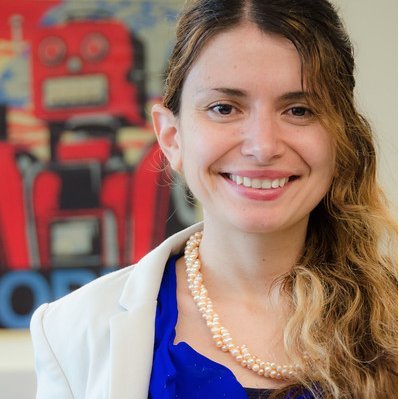
EAAMO colloquium SERIES
Upcoming Events

Cesar Hidalgo: "Why do people judge humans differently from machines? The role of agency and experience"
Cesar Hidalgo, Toulouse School of Economics, Director Center for Collective Learning, Founder of Datawheel.
To attend the colloquium talk please register using this link.
Why do people judge humans differently from machines? The role of agency and experience
People are known to judge artificial intelligence using a utilitarian moral philosophy and humans using a moral philosophy emphasizing perceived intentions. But why do people judge humans and machines differently? Psychology suggests that people may have different mind perception models for humans and machines, and thus, will treat human-like robots more similarly to the way they treat humans. Here we present a randomized experiment where we manipulated people’s perception of machines to explore whether people judge more human-like machines more similarly to the way they judge humans. We find that people’s judgments of machines become more similar to that of humans when they perceive machines as having more agency (e.g. ability to plan, act), but not more experience (e.g. ability to feel). Our findings indicate that people’s use of different moral philosophies to judge humans and machines can be explained by a progression of mind perception models where the perception of agency plays a prominent role. These findings add to the body of evidence suggesting that people’s judgment of machines becomes more similar to that of humans motivating further work on differences in the judgment of human and machine actions.

Alejandra Echeverri: "Policy Mixes for Biodiversity Governance: Governing Colombia's Biocultural Diversity at the Nexus of Sectoral Policies"
Time: 12:00 - 1:00 PM ET | 9:00 - 10:00 AM PT | 6:00 - 7:00 PM CET
Understanding how diverse policymakers govern biodiversity and cultural diversity is critical for addressing environmental challenges. In my talk, I will focus on Colombia, explaining the evolution of six decades of biodiversity governance (1959–2018) by analyzing policy mixes, actor roles, and ecosystem management. I will demonstrate how biodiversity has been mainstreamed into sectoral policies, particularly at the nexus of climate change and poverty, highlighting the need for effective coordination across sectors and actors. Additionally, I will explore Colombia’s biocultural diversity as a case study, showing how the synergies between nature-based and culture-based tourism offer a promising direction for ecotourism policies aimed at integrating biodiversity and cultural diversity. My research underscores the importance of integrating cultural and biological variables into tourism planning to create sustainable biocultural destinations that support both conservation and development goals, particularly in a megadiverse country like Colombia.

Jacqueline Calderón: “Public Health and Environmental Risk Factors in Mexico“
Time: 12:00 - 1:00 PM ET | 9:00 - 10:00 AM PT | 6:00 - 7:00 PM CET
This colloquium will explore new databases from Mexico on the link between environmental risk factors and breast cancer (BC) to reflect on how individuals, health specialists, business owners, and policymakers consider environmental risks in their decision-making processes to shape local and national public health policies. BC is the most frequent neoplasm in Mexico, contributing to almost 17% of malignant neoplasia in women. For the last 20 years the mortality rate of the disease has been increasing. Disparities in access to screening, diagnostic and medical treatment are structural determinants that impact on BC survival. The lack of population-based cancer registers in the country limits the possibility to know the behavior of the disease in younger women. About causal factors, less than 20% of the cases can be linked to inherited genes, suggesting that additional external exposures contribute to the burden of the disease. A recent research study reported novel connections between over 900 chemicals which are commonly found in food, air, water and personal care products, and BC. Mexico is a country in continuous industrialization, with flexible environmental regulations and dense population in urban-industrial neighborhoods. Several open questions remain regarding how to integrate this new evidence into BC prevention strategies, virtual assistance systems, risk management schemes, prediction algorithms, and policy design. The colloquium will outline the practical outcomes of the Social Hackathon initiative, which is aimed at addressing these issues. The Hackathon will take place in the lead-up to the EAAMO 24 conference in San Luis de Potosí.
Past Events
Recent talks
Medium Article - Dr. Lisa Cook
“Can mobile money be used to more efficiently and equitably distribute emergency funds to families affected by the COVID-19 economic crisis?”
Medium Article - Professor Bistra Dilkina


































